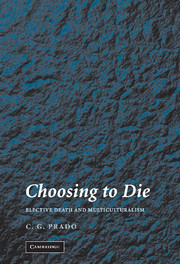Book contents
- Frontmatter
- Contents
- Preface
- 1 Setting the Stage
- 2 Criteria for Rational Suicide
- 3 Clarifying and Revising the Criteria
- 4 Application Issues
- 5 What Standards?
- 6 Relativism and Cross-Cultural Assessment
- 7 The Role of Religion
- 8 Assessment Latitude
- 9 The Realities of Cross-Cultural Assessment
- Works Cited
- Index
6 - Relativism and Cross-Cultural Assessment
Published online by Cambridge University Press: 05 June 2012
- Frontmatter
- Contents
- Preface
- 1 Setting the Stage
- 2 Criteria for Rational Suicide
- 3 Clarifying and Revising the Criteria
- 4 Application Issues
- 5 What Standards?
- 6 Relativism and Cross-Cultural Assessment
- 7 The Role of Religion
- 8 Assessment Latitude
- 9 The Realities of Cross-Cultural Assessment
- Works Cited
- Index
Summary
For a proper historical review of truth's relativization, we should begin with Protagoras, but for our purposes it suffices to begin with Kant and Nietzsche as the thinkers who most directly influenced the development of contemporary relativism. The combination of Kant's and Nietzsche's ideas conceptually enabled a paradigm shift in philosophical thinking about truth, a shift that turned Pilate's question, “What is truth?” from a rhetorical evasion to a philosophical problem. Protagoras's old claim that we are the measure of what there is gained new depth as language became our Newtonian universe and Derrida's “axial” proposition, “There is nothing outside of the text,” became conceivable.
Contemporary relativism was inadvertently conceptually enabled by Kant when he recognized that trying to establish the truth of our beliefs about the world leads us to realize that as Bernard Williams puts it, “We cannot step entirely outside our … conceptions and theories so as to compare them with a world that is not conceptualized at all, a bare ‘whatever there is.’ ” In other words, given the inescapability of conceptualization, of our organizing the contents of awareness in particular ways by applying concepts, it follows inexorably that the world is knowable to us only from one or another conceptually determined perspective. The immediate consequence of this is that our beliefs cannot be established as true by straightforward comparison with reality as it is in itself. We cannot access reality from a conceptually neutral point of view.
- Type
- Chapter
- Information
- Choosing to DieElective Death and Multiculturalism, pp. 111 - 134Publisher: Cambridge University PressPrint publication year: 2008



